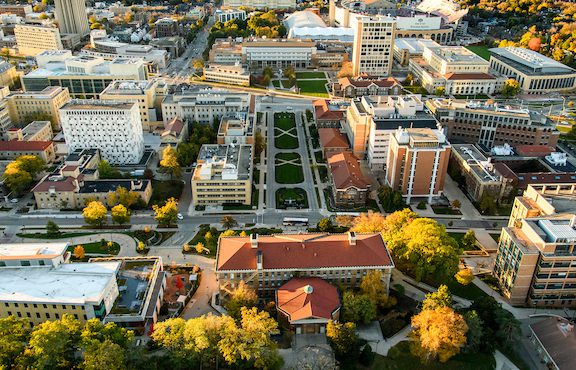Electrical & Computer Engineering: Machine Learning & Signal Processing MS
Master of Science in Electrical and Computer Engineering

The Electrical and Computer Engineering Department offers the Master of Science in Electrical and Computer Engineering: Machine Learning and Signal Processing (MLSP) program which is intended for students looking for an advanced entry into a data science career in industry.
Is this program right for you?
If you want to complete your degree in 12–16 months and have a fast-track into the data science workforce, then the MLSP program is right for you.
Students will learn quantitative thinking, practical problem-solving, and coding, with applications to a variety of domains. The MLSP program is designed to deepen the student’s technical knowledge and sharpen their professional skills for a well-prepared entry into industry. The program provides a practical focus through a course-only curriculum, an accelerated and predictable 16-month completion time and a professional development hands-on project requirement. Well-prepared students and UW–Madison undergraduates may find it feasible to complete the program in 12 months.
The required coursework draws upon foundational and cutting-edge methods in MLSP, and is taught by faculty conducting pioneering research in the field. Successful students will have some experience with linear algebra, statistics and coding. The combined focus on the mathematical foundations of data science and their practical application to real-world problems will prepare graduates to immediately contribute in a variety of different jobs across data science, machine learning and signal processing.
The focus of the MLSP program differs from traditional research-based MS programs. MLSP students do not conduct independent research and prepare a thesis, but rather have an accelerated course plan focused in the MLSP area with a professional development hands-on project, either via an internship/co-op or an independent project. Students also have the opportunity to take select courses from Interdisciplinary Professional Programs. Overall, the MLSP program requires 30 credit hours, including the hands-on project.
Is this program right for you?
If you want to complete your degree in 12–16 months and have a fast-track into the data science workforce, then the MLSP program is right for you.
Students will learn quantitative thinking, practical problem-solving, and coding, with applications to a variety of domains. The MLSP program is designed to deepen the student’s technical knowledge and sharpen their professional skills for a well-prepared entry into industry. The program provides a practical focus through a course-only curriculum, an accelerated and predictable 16-month completion time and a professional development hands-on project requirement. Well-prepared students and UW–Madison undergraduates may find it feasible to complete the program in 12 months.
The required coursework draws upon foundational and cutting-edge methods in MLSP, and is taught by faculty conducting pioneering research in the field. Successful students will have some experience with linear algebra, statistics and coding. The combined focus on the mathematical foundations of data science and their practical application to real-world problems will prepare graduates to immediately contribute in a variety of different jobs across data science, machine learning and signal processing.
The focus of the MLSP program differs from traditional research-based MS programs. MLSP students do not conduct independent research and prepare a thesis, but rather have an accelerated course plan focused in the MLSP area with a professional development hands-on project, either via an internship/co-op or an independent project. Students also have the opportunity to take select courses from Interdisciplinary Professional Programs. Overall, the MLSP program requires 30 credit hours, including the hands-on project.
Admissions requirements
All applicants must:
- Have a Bachelor of Science in electrical or computer engineering from an accredited institution, however bachelor’s degrees in other fields of engineering, computer science, mathematics, statistics or a related discipline will be considered.
- Have a minimum undergraduate GPA of 3.0 on the last 60 credits of degree.
- Submit evidence of English language proficiency, if applicable. The required proficiency scores are: TOEFL IBT 92, PBT 580; or IELTS 7.0.
Application materials required:
- Online application
- Resume/CV
- Statement of purpose
- Transcripts
- Three letters of recommendation
Program highlights
- The Master of Science in Electrical and Computer Engineering: Machine Learning and Signal Processing program is accelerated, so you can graduate in 12-16 months.
- It’s also course-only, so you complete your degree in a predictable time frame.
- With more than $12.8 million in annual research expenditures, nearly 100 patents, and 13 startups, our faculty and students are at the forefront of scientific discovery and real-world translation.
- Our flexible curriculum allows you to customize your degree program to fit your personal objectives.
- Scholarships available
University of Wisconsin–Madison ranked Best Online Graduate Engineering Programs and Best Engineering Grad Schools by U.S. News & World Report.
How you'll learn
- 12-16 months of full-time study on campus to earn your degree.
- May transfer up to 7 credits of prior graduate coursework.
- Culminating summer practicum.
- Half of degree coursework (15 out of 30 total credits) must be graduate coursework. Must maintain 3.00 GPA to remain in the program.
Sample curriculum
Fall Semester (13 credits) – choose four courses from the list below
- Matrix Methods in Machine Learning
- Probability and Information Theory in Machine Learning
- Image Processing
- Introduction to Artificial Neural Networks
- Linear Systems
- Theory of Information Processing and Transmission
- Mathematical Foundations of Machine Learning
- Special Topics (if approved by program director/advisor)
- Digital Signal Processing
- Communication Systems
- Technical Project Management
Spring Semester (9–13 credits) – choose at the minimum four courses from the list below
- Machine Learning
- Introduction to Optimization
- Optimal Systems
- Signal Synthesis and Recovery Techniques
- Advanced Digital Image Processing
- Theoretical Foundations of Machine Learning
- Special Topics (if approved by program director/advisor)
- Communication Systems II
Summer (2–5 credits)
- Capstone Project in Machine Learning and Signal Processing (5 credits)
- Co-op (2 credits)
Job outlook
- Electrical Engineers
- Engineering Managers
- Project Engineers
- Principal Engineers
- Controls Engineers
- Boeing
- Northrop Grumman
- Lockheed Martin
- Raytheon Technologies
- GE
Source: Lightcast™ 2022
Ready to learn more about Electrical & Computer Engineering: Machine Learning & Signal Processing MS?
View the UW-Madison Guide
Stay in touch
Sign up to receive application tips and deadline reminders.
Connect with our enrollment coaches
Our friendly, knowledgeable enrollment coaches are here to answer your questions. Contact an enrollment coach to:
- Learn how to make this program work with your life/schedule
- Get help with your application
- Determine if financial aid is available
Visit with our coaches on campus or at an upcoming student fair in your area. Search student fairs & events.

The MLSP program offers a unique blend of comprehensive study in both machine learning and signal processing. It equips students with the practical skills to analyze, develop and implement advanced algorithms, preparing them for real-world problem-solving in the rapidly evolving fields of machine learning, deep learning and signal processing.
Dr. Kangwook Lee, faculty director, MS program in MLSP, UW–Madison


